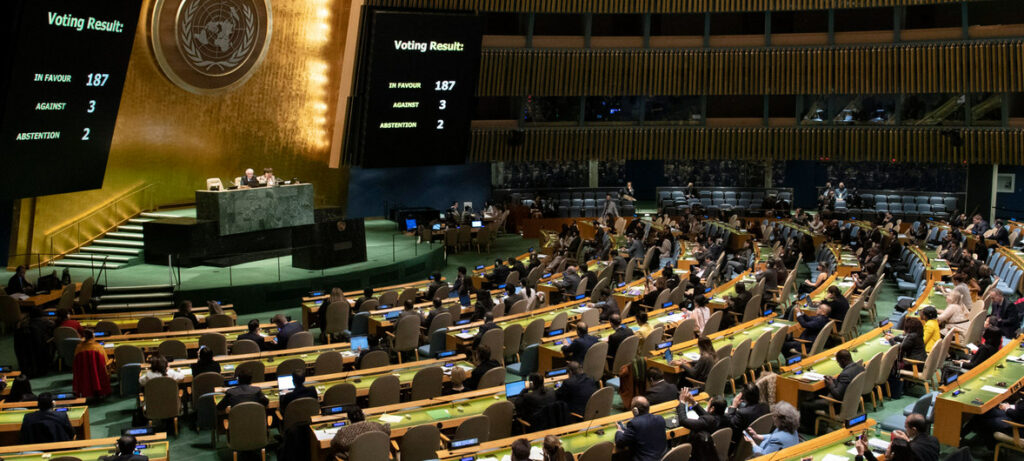UN Member States Overwhelmingly Support End of US Embargo against Cuba
LATIN AMERICA AND THE CARIBBEAN, 11 Nov 2019
UN News – TRANSCEND Media Service
For the 28th consecutive year, the UN General Assembly has adopted a resolution calling for an end to the economic, commercial and financial embargo imposed by the United States against Cuba.
7 Nov 2019 – During a vote held on Wednesday [6 Nov], 187 Member States underlined their support for the resolution while Brazil and Israel joined the US in voting no.
Two countries—Colombia and Ukraine—abstained.
“Like all nations, we get to choose which countries we trade with. This is our sovereign right,” Kelly Craft, the US Ambassador to the UN, said prior to the vote.
“So, it is worrying that the international community, in the name of protecting sovereignty, continues to challenge this right.”

UN General Assembly votes on the necessity of ending the economic, commercial and financial embargo imposed by the United States against Cuba. UN Photo/Evan Schneider
Blockade ‘An Act of Genocide’: Cuban Foreign Minister
The embargo is rooted in the Cold War, when Fidel Castro and his revolutionaries seized power.
Tensions only eased more than a half-century later when the Obama administration established diplomatic relations with Cuba, modifying several aspects of the embargo such as lifting some travel restrictions.
As the resolution states, these policies “contrast” with measures implemented by the current President, Donald Trump, in 2017.
Cuba’s Foreign Minister, Bruno Rodríguez Parrilla, reported that in recent months Washington has begun to “escalate aggression”, including by preventing international fuel shipments to the island, scaling down consular services, and attacking national programmes that support other developing countries.
“The blockade has caused incalculable humanitarian damages. It is a flagrant, massive and systematic violation of human rights,” he charged. “It qualifies as an act of genocide under Articles II (b) and (c) of the Convention on the Prevention and Punishment of the Crime of Genocide, adopted in 1948. There is not one single Cuban family that has not suffered the consequences of this.”
The vote was preceded by presentations, which began on Tuesday.
Palestine, speaking on behalf of the developing countries’ bloc the Group of 77 and China, regretted that the US has strengthened the embargo.
“From April 2018 to March this year, the impact of the US embargo on Cuba’s foreign trade amounts to more than $4 billion,” Ambassador Riyad Mansour said. “Limited foreign investment and difficult access to development credits translate directly into economic hardship and humanitarian impacts for the people Cuba. The country’s socio-economic reforms have also been hampered by the embargo.”
Embargo Threatens Our Development: Caribbean Countries
The 15 members of the Caribbean Community (CARICOM) highlighted Havana’s support to the region. Cuba has deployed medical professionals to distressed areas, including those affected by natural disasters, among other initiatives.
Keisha McGuire, Grenada’s Ambassador to the UN, recalled that the country was among the first to assist The Bahamas in the aftermath of Hurricane Dorian in September.
She characterized the embargo as “an anachronism and aberration” in an era when global cooperation is critical to address common challenges such as climate change.
“It is in this broader context that we view the embargo—not just as a punitive act against Cuba but as an impediment to Caribbean regional development as a whole,” she told the General Assembly.
Tags: Blockade, Capitalism, Collective Punishment, Conflict, Cruelty, Cuba, Culture, Democracy, Development, Economics, Embargo, Environment, Geopolitics, Hegemony, History, Human Rights, Imperialism, Indigenous Rights, International Relations, Justice, Latin America Caribbean, Neocolonialism, Neoliberalism, Nonviolence, Politics, Power, Sanctions, Social justice, Socialism, Solutions, State Terrorism, UN, USA, Violence, West, World
DISCLAIMER: The statements, views and opinions expressed in pieces republished here are solely those of the authors and do not necessarily represent those of TMS. In accordance with title 17 U.S.C. section 107, this material is distributed without profit to those who have expressed a prior interest in receiving the included information for research and educational purposes. TMS has no affiliation whatsoever with the originator of this article nor is TMS endorsed or sponsored by the originator. “GO TO ORIGINAL” links are provided as a convenience to our readers and allow for verification of authenticity. However, as originating pages are often updated by their originating host sites, the versions posted may not match the versions our readers view when clicking the “GO TO ORIGINAL” links. This site contains copyrighted material the use of which has not always been specifically authorized by the copyright owner. We are making such material available in our efforts to advance understanding of environmental, political, human rights, economic, democracy, scientific, and social justice issues, etc. We believe this constitutes a ‘fair use’ of any such copyrighted material as provided for in section 107 of the US Copyright Law. In accordance with Title 17 U.S.C. Section 107, the material on this site is distributed without profit to those who have expressed a prior interest in receiving the included information for research and educational purposes. For more information go to: http://www.law.cornell.edu/uscode/17/107.shtml. If you wish to use copyrighted material from this site for purposes of your own that go beyond ‘fair use’, you must obtain permission from the copyright owner.
Read more
Click here to go to the current weekly digest or pick another article:
LATIN AMERICA AND THE CARIBBEAN:
